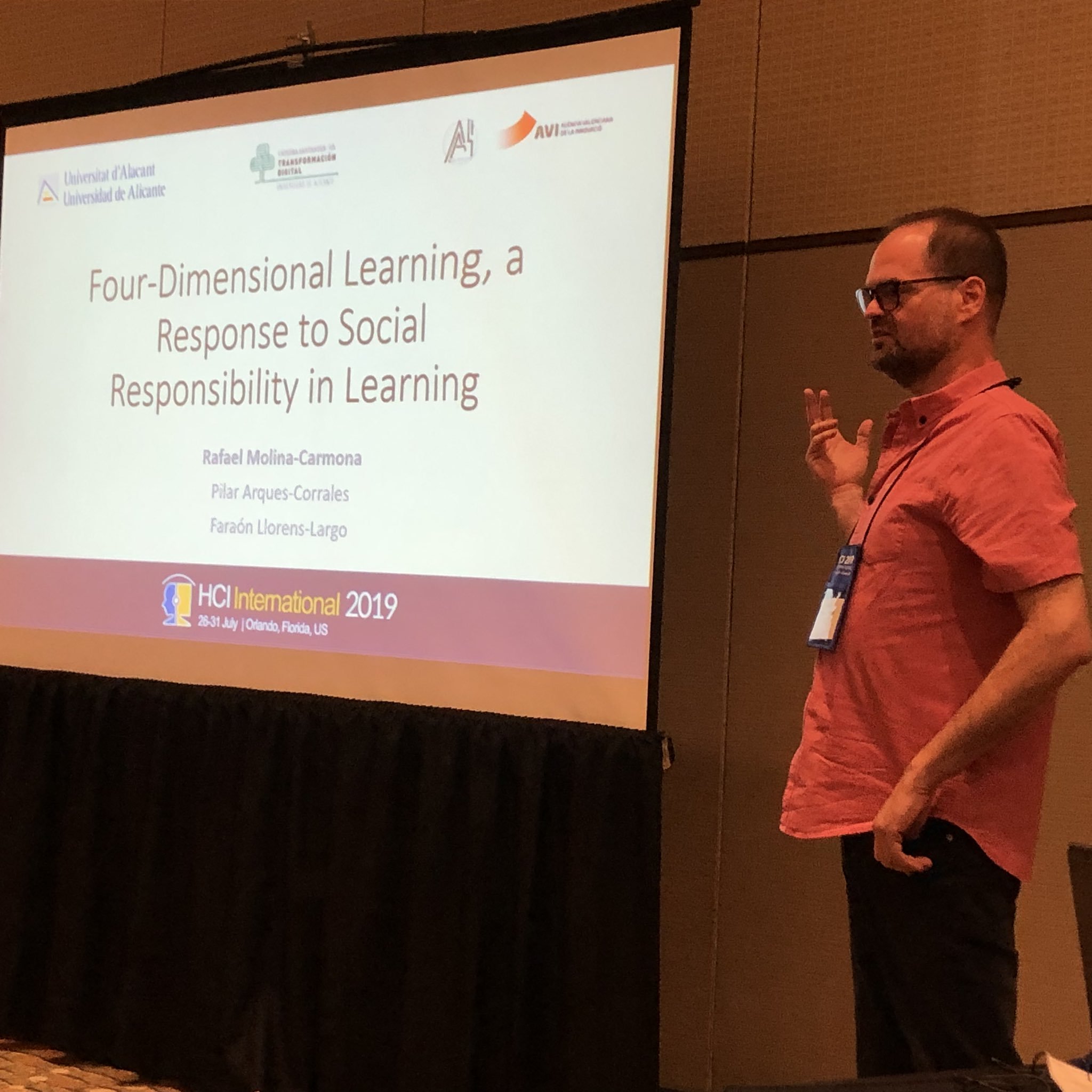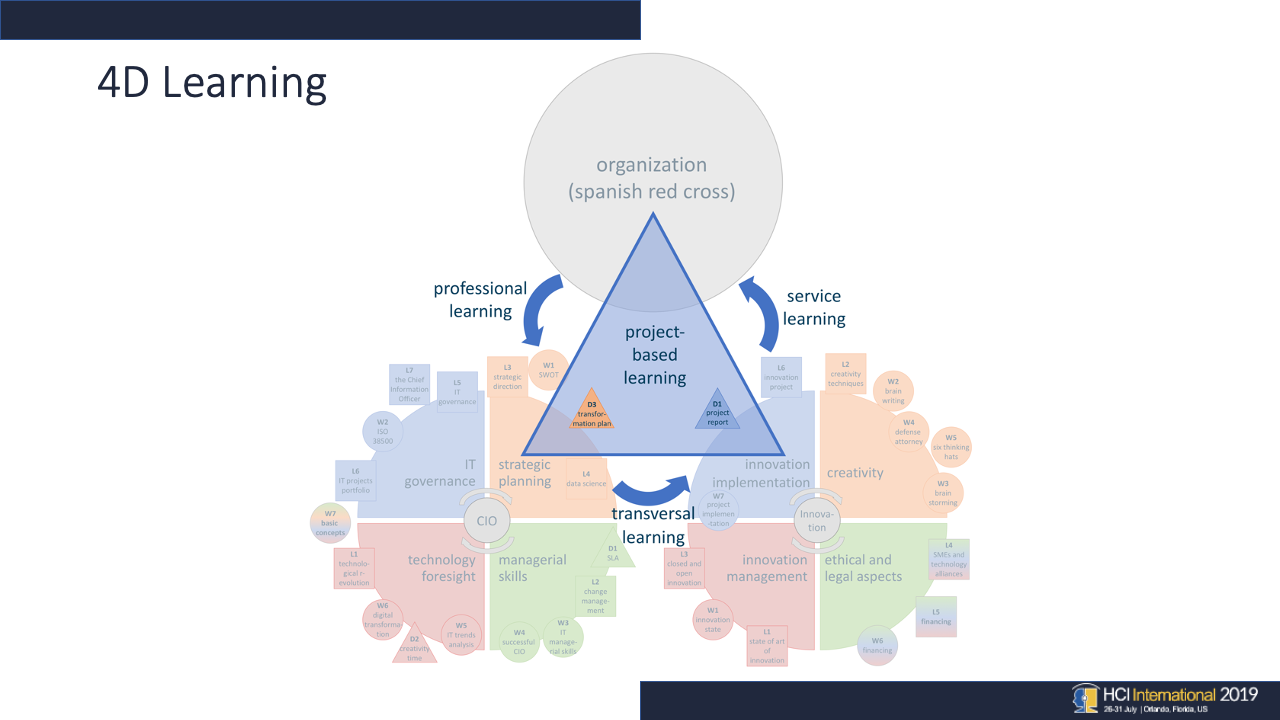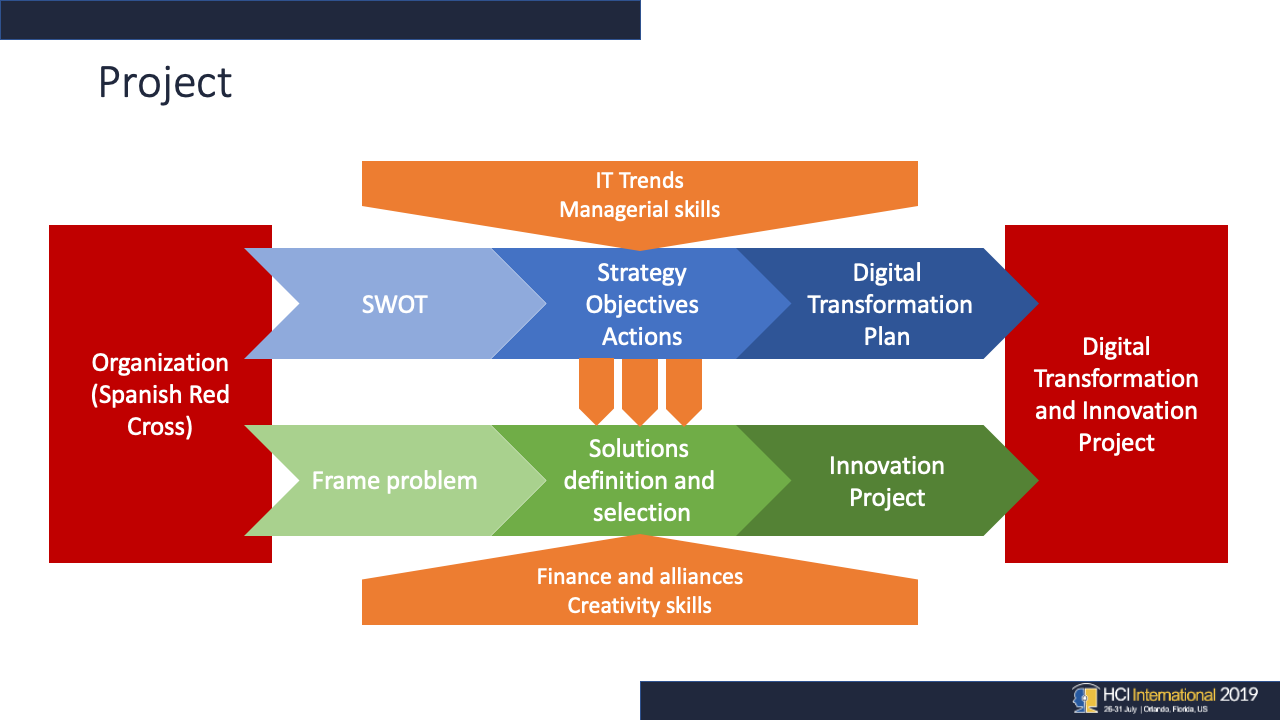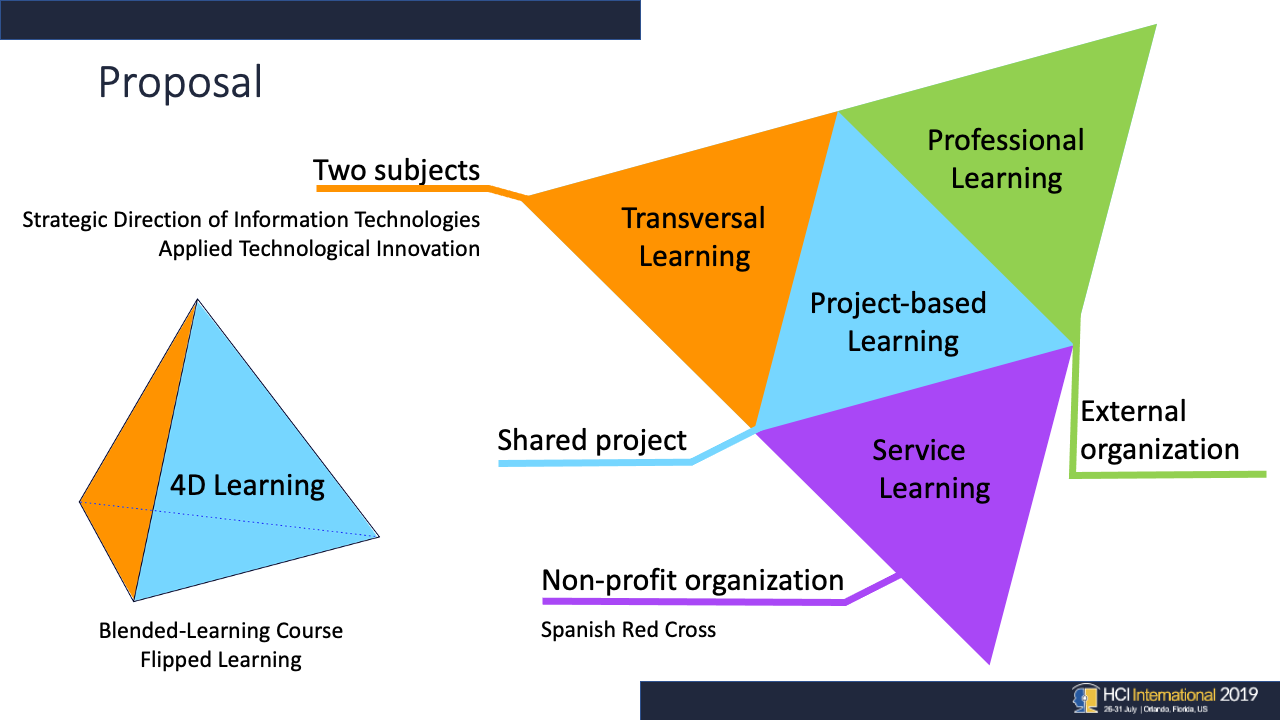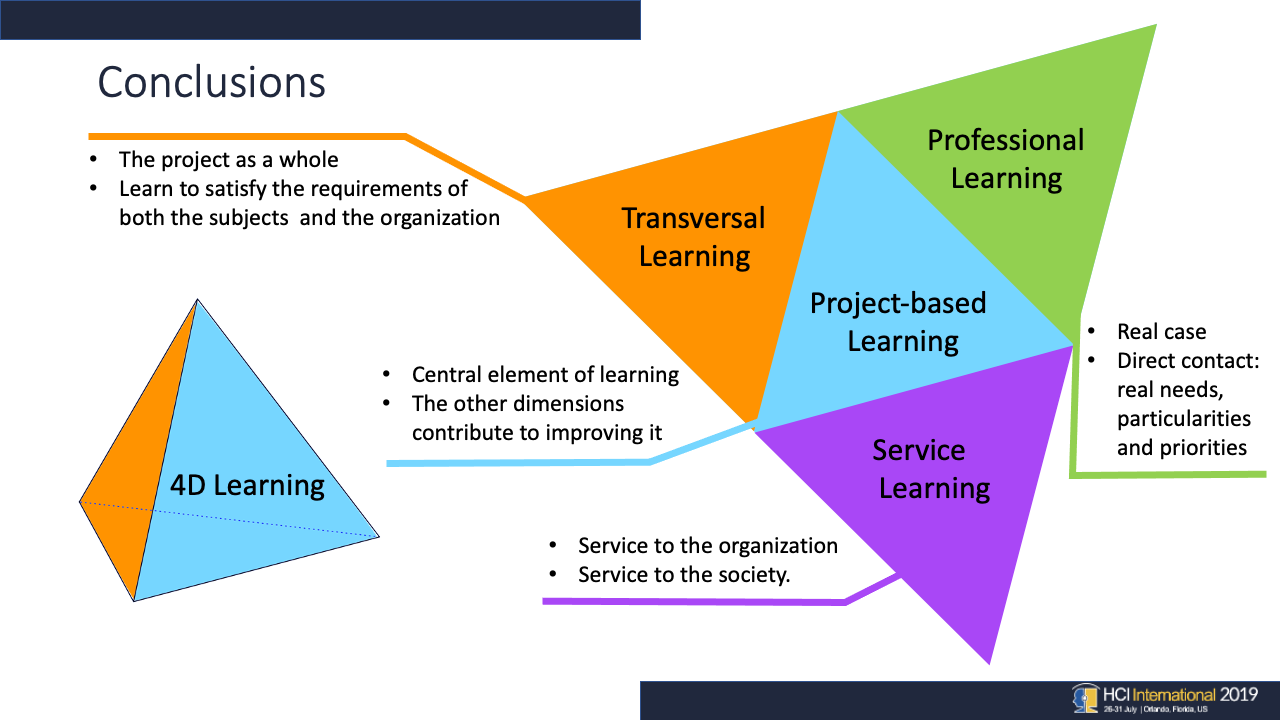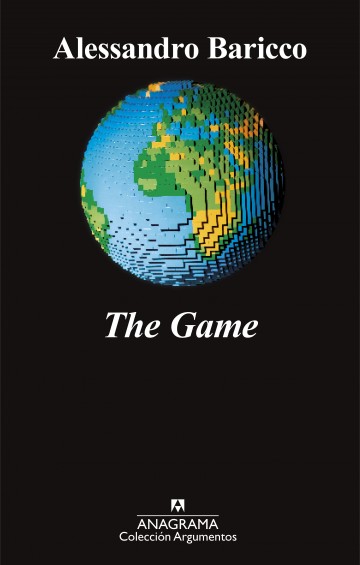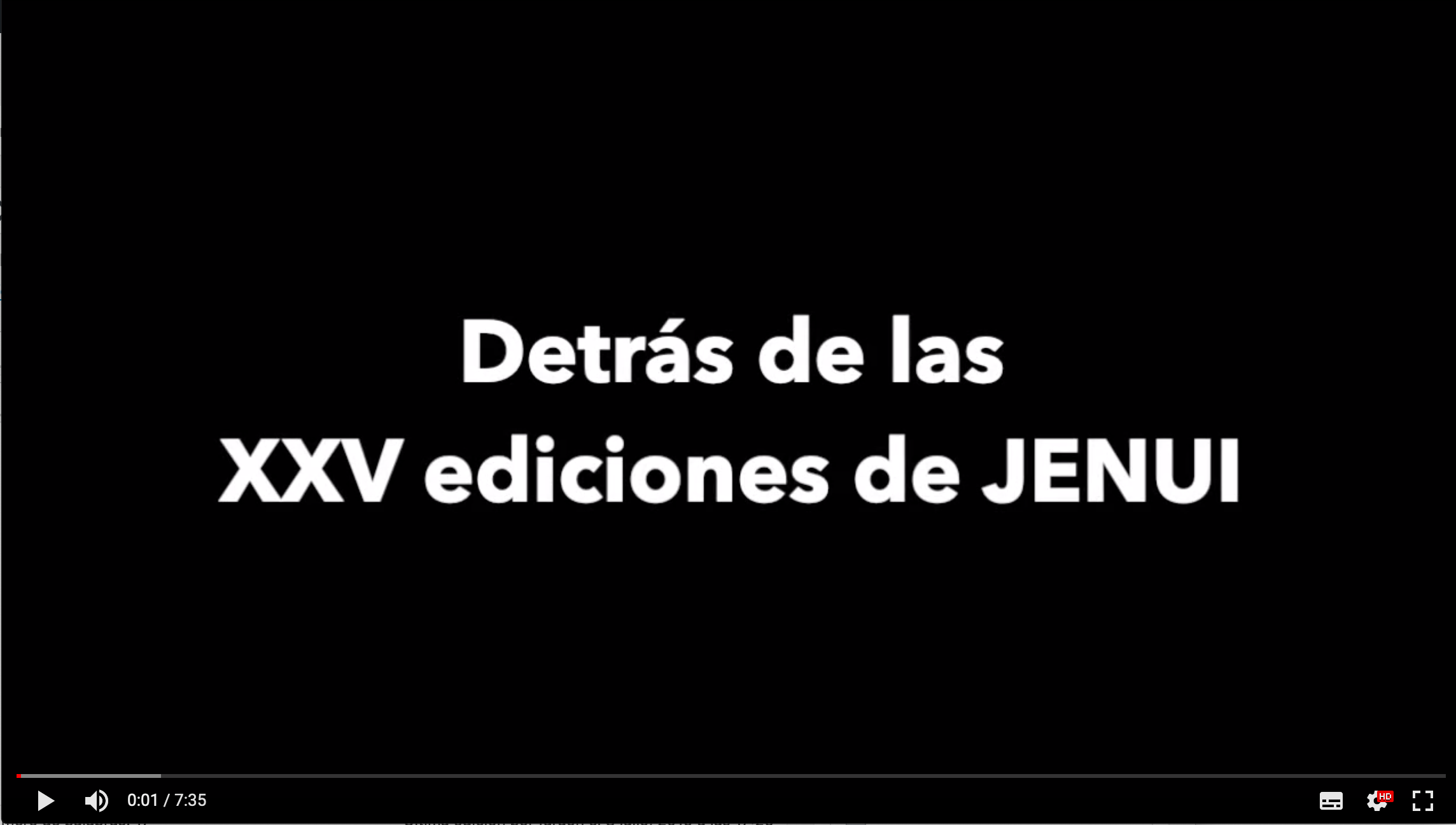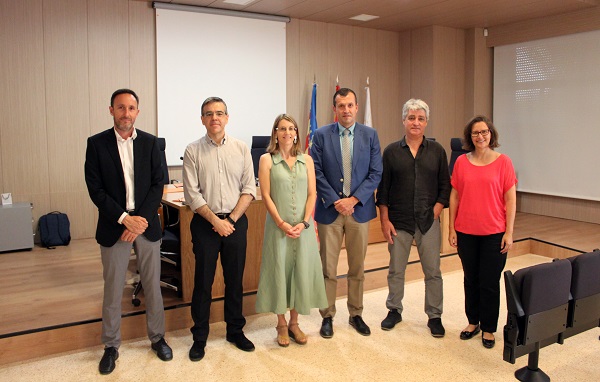Four-Dimensional Learning, a Response to Social Responsibility in Learning
Four-Dimensional Learning, a Response to Social Responsibility in Learning
Rafael Molina-Carmona, Pilar Arques-Corrales, and Faraón Llorens-Largo
21th International Conference on Human-Computer Interaction (HCII 2019)
Orlando, Florida, USA
26-31 July 2019
6th International Conference on Learning and Collaboration Technologies (LCT 2019).
https://doi.org/10.1007/978-3-030-21814-0_14
Abstract
Corporate Social Responsibility can be considered as the integration in an organisation of social and environmental concerns in their operations and in their interaction with their stakeholders on a vol- untary basis. Universities, as leaders in higher education and scientific advancement, have long adopted this social responsibility from several points of view, particularly training their students. Our research focuses on effectively introducing the social factor in the training of engineers. In order to do this, four principles or dimensions define our proposal: Project-Based Learning, that uses an engineering project as a central element of learning; Transversal Learning, that uses a project defined between several disciplines; Professional Learning, which takes place in an environment that is very close to the professional context; and Service Learning, in which the academic results not only benefit the learner but also the society. In short, we propose a transversal project-based learning experience developed in collaboration with an external organisation that contributes its problems and collects the solutions developed by the stu- dents. As a consequence of this collaboration, the students are introduced to a real professional environment, and provide both a strategic vision of the organisation and innovative solutions to their problems. In addition, the institution has a social character as it is a non-profit organisation that works with disadvantaged people (Spanish Red Cross), which turns the experience into a service learning experience. The result is encourag- ing and very positive, as evidenced by the opinions of students, teachers and the organisation that hosts the experience.
Keywords
Corporate Social Responsibility in Universities, Project-Based Learning. Transversal Learning, Professional Learning, Service Learning
Cite this paper as:
Molina-Carmona R., Arques-Corrales P., Llorens-Largo F. (2019) Four-Dimensional Learning, a Response to Social Responsibility in Learning. In: Zaphiris P., Ioannou A. (eds) Learning and Collaboration Technologies. Designing Learning Experiences. HCII 2019. Lecture Notes in Computer Science, vol 11590. Springer, Cham
A guide for making video games accessible to users with cerebral palsy
A guide for making video games accessible to users with cerebral
palsy
Patricia Compañ-Rosique, Rafael Molina-Carmona, Francisco Gallego-Durán, Rosana Satorre-Cuerda, Carlos Villagrá-Arnedo and Faraón Llorens-Largo
Universal Access in the Information Society
ISSN: 1615-5289 (Print) 1615-5297 (Online)
First Online: 23 July 2019
https://link.springer.com/article/10.1007/s10209-019-00679-6
Springer Nature SharedIt initiative: https://rdcu.be/bLwbO (permite visualizar el artículo completo)
Abstract
Video games were initially considered as a form of entertainment. Today, this perception has changed. Many video games have been designed for a wide range of purposes: education, rehabilitation, etc. This paper presents our experience developing video games in collaboration with an association of users with cerebral palsy. Cerebral palsy is characterized by a group of permanent disorders of the development of movement and posture, causing activity limitation. This means that people affected by this disease are unable to handle the usual devices used in video games. Moreover, video games offer these people a form of leisure that can also benefit them in many ways: autonomy, strength, coordination, self-confidence, learning from error, etc. Three adapted video games have been developed as well as a guide for designing accessible video games for people with cerebral palsy. This experience has served to study and design new ways of making video games accessible to disabled people, giving them the chance to exercise their right to entertainment.
Keywords
Accessibility Accessible video games Video games for disability
The Game
The Game
Alessandro Baricco
ANAGRAMA (www.anagrama-ed.es)
Colección Argumentos
https://www.anagrama-ed.es/libro/argumentos/the-game/9788433964366/A_530
Frases entresacadas e ideas interesantes que puedo utilizar:
(Página 154)
“Puedo incluso arriesgarme a plasmar, para uso de todo el mundo, los rasgos genéticos de esa especie destinada a sobrevivir:
– un diseño agradable capaz de generar satisfacciones sensoriales;
– una estructura que remite al esquema elemental problema/solución repetido varias veces;
– poco tiempo entre cualquier problema y su solución;
– aumento progresivo de las dificultades de juego;
– inexistencia e ineficacia de la inmobilidad;
– aprendizaje dado por el juego y no por el estudio de abtractas instrucciones de uso;
– disfrute inmediato, sin preámbulos;
– tranquilizante exhibición de una puntuación después de determinados pasos.”
Y el aviso para el sitema educativo:
“Bueno, no se me ocurre nada más: pero tengo una noticia importante para todos vosotros: aparte de raras excepciones, si estáis haciendo algo que no tiene, por lo menos, la mitad de estas características, es que estáis haciendo algo que está muerto desde hace tiempo.
Estáis autorizados a poneros nerviosos.”
Por eso estoy investigando en la gamificación de la enseñanza en la universidad.
XXV aniversario de JENUI (Jornadas sobre la Enseñanza Universitaria de la Informática)
Vídeo conmemorativo del XXV aniversario de JENUI (Jornadas sobre la Enseñanza Universitaria de la Informática)
jenui2019.inf.um.es
¿Nos quitarán las inteligencias artificiales el puesto de trabajo?
¿Nos quitarán las inteligencias artificiales el puesto de trabajo?
Faraón Llorens
2 de julio de 2019
La transformación digital del empleo: desafíos y oportunidades
Curso de Verano de la Universidad de Alicante “Rafael Altamira”
https://web.ua.es/es/verano/2019/campus/la-transformacion-digital-del-empleo-desafios-y-oportunidades.html
Del 1 al 4 de julio de 2019
Qué es y qué no es transformación digital
Qué es y qué no es transformación digital
Faraón Llorens
1 de julio de 2019
La transformación digital del empleo: desafíos y oportunidades
Curso de Verano de la Universidad de Alicante “Rafael Altamira”
https://web.ua.es/es/verano/2019/campus/la-transformacion-digital-del-empleo-desafios-y-oportunidades.html
Del 1 al 4 de julio de 2019
